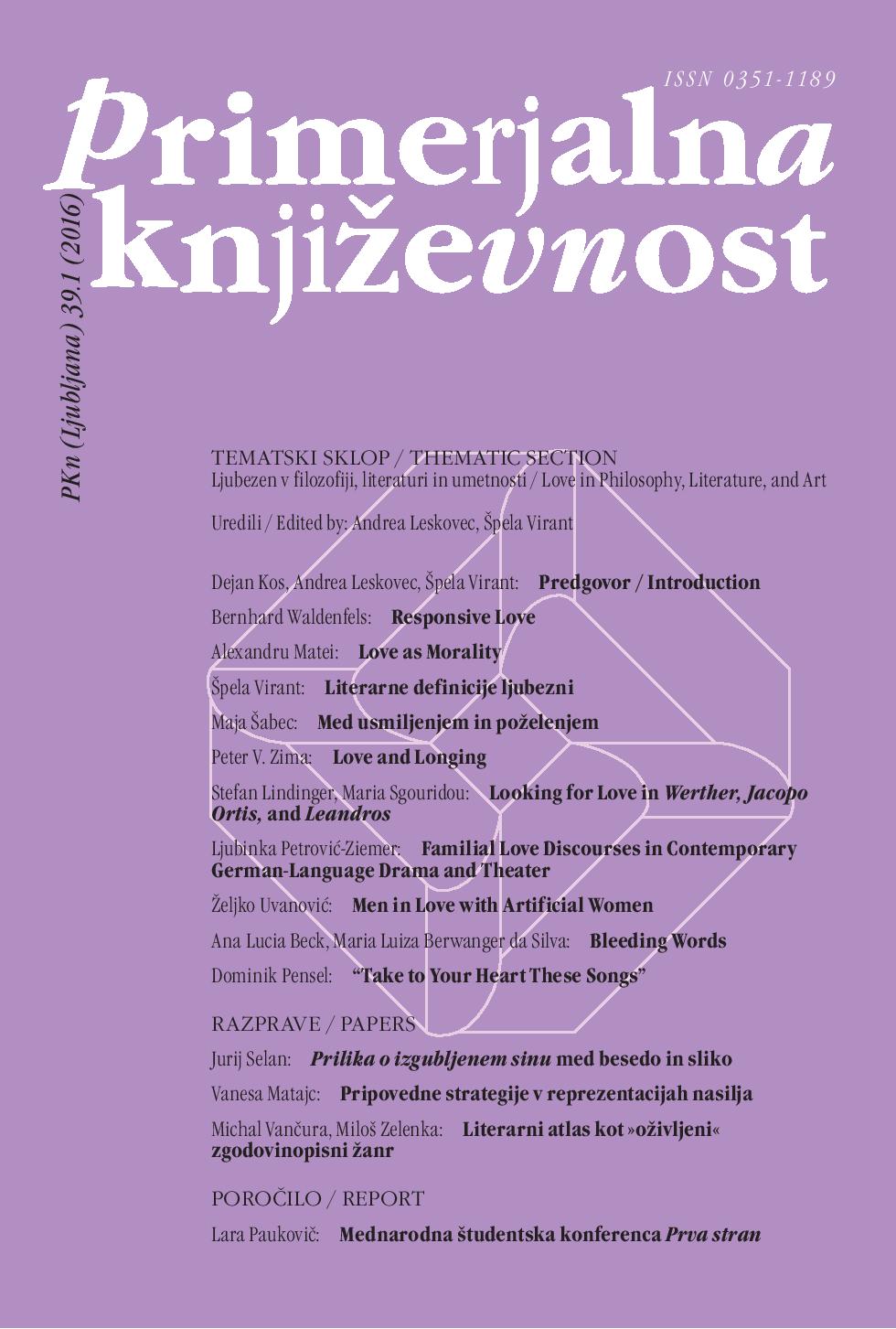Narrative Strategies in the Representation of Violence: Two Contemporary Bosnian Novels About the Bosnian War
Keywords:
Bosniak literature, contemporary Bosnian novel, war in Bosnia (1992–1995), Yugoslav wars (1991–2001), Ključanin, Zilhad, Šehid, Karahasan, Dževad, The Night Council, the fantastic, narrative strategies of temporalityAbstract
The breakup of the Socialist Federal Republic of Yugoslavia unravelled concomitantly with the Yugoslav Wars (1991–2001), which exercised the politics of ethnic cleansing (ethnic communities and their identity material symbols) in the territories of today’s Croatia, Bosnia and Herzegovina, Serbia, etc. by referring to the nationalist-ideological understanding of territory as ethnic space. The aggressor’s “argumentation” of ethnocide against the Muslim communities that inhabited Bosnian territory is grounded in the Balkanist discourse about the historical site of confrontations between “East” and “West” or between (Catholic and Orthodox) Christianity and Islam, which contributed to the formation of an ethnically heterogeneous space following the expansion of the Ottoman Empire into the Balkans. In the 19th century, the idea of nationalism (nationalisms), supported by the collective memories of referential ethnic communities, perpetuated especially in folk epic poetry, portrayed the violence as interreligious or as interethnic conflicts deriving from them. Through a comparative reading of two contemporary Bosnian novels (Zilhad Ključanin’s Šehid and Dževad Karahasan’s Noćno vijeće (The Night Council)), which recount the Bosnian War (1992–1995) by (partly) employing testimonial discourses, and in the context of novels also referring to the Yugoslav Wars (written by the authors such as Vojnović, Jergović, Nikolaidis, Drndić, Imamović, Taljić), the article attempts to apprehend how and with what narrative strategies is it possible to narrate the practices of ethnocide in a space between fiction and a brutally experienced history: from the revived collective memory of the Bosniak community, which narratives shape into motifs and themes of “spectres” from the historical repetitions of violence against Muslim communities and their culmination in a “circular” and “melded” temporalities which bind the past to the present of the war experience. In the context of the Islamic religion and its central text (Quran/Qur’an), images of horror and attempts to overcome the horror through narration in Ključanin’s intertextual novel Šehid can also step out of the interpretative field of the magical realism and into the domain of the religious real. On the other hand, the fantastic “spectres” and spatial reference to the Islamic berzah in Karahasan’s The Night Council serve as narrative device which, together with narrative strategy of the “melded time”, suggests a chance of forming the common collective memory, shared by different ethnic communities.References
Begić, Midhat. »Uz književna kretanja u Bosni i Hercegovini poslije oslobođenja«. Midhat Begić. Djela. Zv. 5. Sarajevo: Svjetlost/V. Masleša, 1988.
Bennet, Andrew in Nicholas Royle. An Introduction to Literature, Criticism and Theory. Dorchester: Pearson Longman, 2004.
Carmichael, Cathie. Ethnic Cleansing in the Balkans: Nationalism and the Destruction of Tradition. Taylor & Francis, 2004. Splet. 15. 9. 2015. https://www.questia.com/read/102726663/ethnic-cleansing-in-the-balkans-nationalism-and-the.
Denić-Grabić, Alma. »Kraj dvadesetog stoljeća: bosanskohercegovački roman između globalnog i lokalnog«. Sarajevske sveske 27/28 (2010): 285–300.
Drndić, Daša. Canzone di guerra. Prev. Đurđa Strsoglavec. Celje: Celjska Mohorjeva družba, 2011.
Duraković, Enes. Bošnjačke i bosanske književne neminovnosti. Zenica: Vrijeme, 2003.
– – –. Orijentologija: univerzum sakralnog teksta. Sarajevo: Tugra, 2007.
Geary, Patrick J. Mit narodov. Srednjeveški izvori Evrope. Ljubljana: Studia humanitatis, 2005.
Imamović, Jasmin. Prosim te, zapiši. Prev. Jurij Hudolin. Ljubljana: KUD Apokalipsa, 2009.
Jergović, Miljenko. Pleše v somraku. Prev. Aleksandra Rekar. Ljubljana: Sanje, 2007.
– – –. Oče. Prev. Aleksandra Rekar. Ljubljana: Sanje, 2014.
Jezernik, Božidar. Divja Evropa. Ljubljana: Slovenska matica, 2011.
Juvan, Marko. Prešernovska struktura in svetovni literarni sistem. Ljubljana: LUD Literatura, 2012.
Karahasan, Dževad. Nočni shod. Prev. Jana Unuk. Ljubljana: Cankarjeva založba, 2011.
Kazaz, Enver. »Prizori uhodanog užasa«. Sarajevske sveske 5 (2004): 137–166.
– – –. »Tranzicijska etnokulturna pustinja«. Sarajevske sveske 27/28 (2010): 83–100.
Ključanin, Zilhad. Pričevalec. Prev. Damijan Šinigoj. Novo mesto: Goga, 2001.
Kur’an. Kur’an s latiničnom transkripcijom i prijevodom na bosanski jezik. Prev. Besim Korkut. Sarajevo: AA, 2007/1428 h.g.
Kora’n. Prevod iz arabskega izvirnika. Prev., spremno besedo in opombe napisala Mohsen Alhady in Margit P. Alhady; predgovor Enes Karić. Ljubljana: Beletrina, 2014.
Kora’n. Prev. Erik Majaron. Tržič: Učila International, 2005.
Lukić, Jasmina. »Recent Historical Novels and Historiographic Metafiction in the Balkans«. History of the Literary Cultures of East-Central Europe. Junctures and Disjunctures of the 19th and 20th Centuries. Zv. 1. Ur. John Neubauer in Marcel Cornis-Pope. Amsterdam, Philadelphia: John Benjamins Publishing Company, 2004. 480–493.
Matajc, Vanesa. »Medbesedilna razmerja med ustno zgodovino in literaturo v pričevanju«. Acta Histriae 19/1–2 (2011): 301–318.
Mrak, Anja. Magični realizem in feministična narativna tehnika. Doktorska disertacija. Ljubljana: Filozofska fakulteta Univerze v Ljubljani, 2015.
Musabegović, Senadin. »Pisanje o ratu«. Sarajevske sveske 5 (2004): 9–16.
Nikolaidis, Andrej. Mimesis. Prev. Aleš Čar. Ljubljana: Študentska založba, 2006.
Neubauer, John. »Introduction: Folklore and National Awakening«. History of the Literary Cultures of East-Central Europe. The Making and Remaking of Literary Institutions. Zv. 3. Ur. John Neubauer in Marcel Cornis-Pope. Amsterdam, Philadelphia: John Benjamins Publishing Company, 2004. 269–293.
Pirjevec, Jože. Jugoslovanske vojne 1991–2001. Ljubljana: Cankarjeva založba, 2003.
Rakić, Milan. »Simonida«. Splet. 7. 12. 2015. http://srednjeskole.edukacija.rs/biografijepoznatih-licnosti/simonida-nemanjic.
Ravbar, Miroslav in Stanko Janež. Pregled jugoslovanskih književnosti. Maribor: Založba Obzorja, 1960.
Richardson, Brian. »Beyond Story and Discourse: Narrative Time in Postmodern and Nonmimetic Fiction«. Narrative Dynamics: Essays on Time, Plot, Closure, and Frames. Ur. Brian Richardson. Columbus: Ohio State University, 2002. 47–63.
– – –. Unnatural Voices. Columbus: Ohio State University, 2006.
Strsoglavec, Đurđa. »(Avto)biografije Daše Drndić.« Canzone di guerra. Daša Drndić. Celje: Celjska Mohorjeva družba, 2011. 153–158.
Taljić, Isnam. Roman o Srebrenici. Prev. Janko Moder. Mengeš: Ciceron, 2005.
Todorova, Maria. Imaginarij Balkana. Ljubljana: ICK, 2001.
Vervaet, Stijn. Centar i periferija u Austro-Ugarskoj. Dinamika izgradnje nacionalnih identiteta u Bosni i Hercegovini od 1878. do 1918. godine na primjeru književnih tekstova. Zagreb, Sarajevo: Synopsis, 2013.
Virk, Tomo. Strah pred naivnostjo. Ljubljana: LUD Literatura, 2000.
Vlaisavljević, Ugo. Rat kao najveći kulturni događaj: ka semiotici etnonacionalizma. Sarajevo: Mauna-fe Publishing, 2007.


